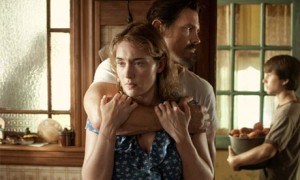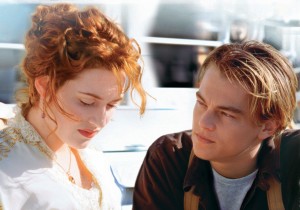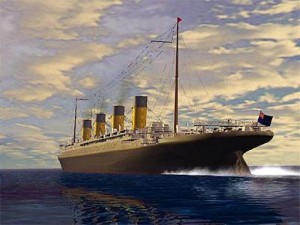Labor Day
Posted on January 30, 2014 at 6:00 pm
 On the surface, “Labor Day” feels like would-be Nicholas Sparks, a syrupy romance about two people with damaged hearts finding a healing love in a picturesque setting. But like a pretty chocolate candy with a filling that turns out to be surprisingly sour, this film based on the novel by Joyce Maynard
On the surface, “Labor Day” feels like would-be Nicholas Sparks, a syrupy romance about two people with damaged hearts finding a healing love in a picturesque setting. But like a pretty chocolate candy with a filling that turns out to be surprisingly sour, this film based on the novel by Joyce Maynard is poisoned by Maynard’s trademark narcissism and her notion of love that never progressed beyond pulp-infused fantasies. For Maynard, the only purpose of perfect love is to be endlessly worshiped by everyone, including a hunky guy who can literally and metaphorically clean her gutters and change her oil and also bake overripe peaches into a swoon-worthy pie, no measuring cup needed.
Youch. Maynard, the empress of TMI, is a gifted writer who endlessly plumbs her favorite subject — herself. The New York Times Magazine cover story in which she attempted to define her generation at age 18 led to a book contract (Looking Back: A Chronicle of Growing Up Old in the Sixties) and a series of fan letters from J.D. Salinger that invited her to drop out of college and move in with him. And all of that led to a series of non-fiction and thinly disguised fictional stories and books about her dysfunctional parents, her marriage, her divorce, her children, her sister who is not as close to her as she would like, her beautiful homes and wonderful cooking, more more more on her children (the three she gave birth to and two more she adopted until the adoption did not work out and she found another home for them), more on her divorce, the first breast implants, the second breast implants, the removal of the implants, many splendid pies and many not so splendid relationships including a famously reclusive author
and an intense correspondence with a prisoner that was one of the inspirations for this story. The primary themes of her writing, lurking just under the surface tone of intimacy and comfort, are her fantasy of being utterly adored and the pain and never-ending sense of surprise and disappointment of discovering, over and over again, that she cannot seem to find it.
Those themes can be and have been turned into compelling stories, even literature. But that requires a level of self-awareness that is utterly beyond Maynard, or, apparently director Jason Reitman, who wrote the screenplay based on her book. Compare her novel, To Die For, based on the real-life case of the young wife who persuaded her 15-year-old lover and his friends to kill her husband, to the far superior movie starring Nicole Kidman and Joaquin Phoenix. Thanks to screenwriter Buck Henry (“The Graduate”) and director Gus Van Sant, one key difference is that the film version slyly tweaks her story. The film has some perspective on its clueless, narcissistic, chocolate spider of an anti-heroine (a sizzling portrayal by Kidman), while Maynard’s version seems to suggest that it sure would be nice to be so loved that you could talk someone into killing for you.
And that brings us to this story, in which Adele (a game but pasty-looking Kate Winslet), a depressed and fragile single mother, is unreservedly loved not just by her 13-year-old son Henry (Gattlin Griffith) and by Frank (Josh Brolin), the escaped prisoner who takes her hostage (but in the most gentlemanly way possible, performing all kinds of handyman chores, teaching her son manly throwing skills, being kind to a kid in a wheelchair, and making the gooey, luscious, no measuring cups allowed pie). Even (spoiler alert) the ex-husband (Clark Gregg) has to chime in as well with the ultimate fantasy of the wife left for the babysitter — a confession that the ex-wife was just too beautiful and deep and all-around fine for him to handle. The narrator is the now-adult son (Tobey Maguire), looking nostalgically back on end of the summer of 1987, when his efforts to cheer up his mother included a “Husband for a Day” coupon book. Maynard has said this was inspired by a gift from her own son. The film conveys no understanding that this might be evidence that she should be more careful about boundary issues (even worse is her sex talk) or that it is parents who should care for children, not the other way around.
Henry has outgrown his clothes, so he has to cajole Adele into a rare trip to the store. There he is sized up by Frank, bleeding and wounded, who grabs a hat and sweatshirt from the rack and tells Adele that Henry has agreed she will give him a ride. He tells her to drive him to her house, and then he tells her he will just stay until dark. But pretty soon he is literally and metaphorically oiling her hinges. Politely tying her up just to preserve her deniability in case he is found, he takes a few ingredients he finds in the kitchen and whips together a succulent chli, feeding her almost tenderly. And then a neighbor comes over to drop off some ripe peaches, and they make every attempt to do to pastry what “Ghost” did for a potter’s wheel. Unfortunately, it does to pastry what the many spoofs of the potter’s wheel scene have done instead.
Hunky as he is, we are never in thrall to Frank as Adele and Henry are. His handyman perfection and meaningful glances are just too over the top and the backstory, when it finally comes, does not satisfy our need to understand and forgive him. The entire last third of the film involves so many bad decisions — no, not just bad, catastrophically imbecilic — that we lose our sympathy for just about everyone involved.
Parents should know that there are some disturbing images of a bloody wound and a homicide and an off-camera very sad death of an infant. There are sexual references and references to adultery and non-explicit situations. Characters are in peril and there are some uncomfortable family interactions.
Family discussion: What did Frank and Adele understand about each other? What could Gerald have done to be a better father? Why did Henry want to stay with his mother?
If you like this, try: the books and movies from Nicholas Sparks and “The Bridges of Madison County”



